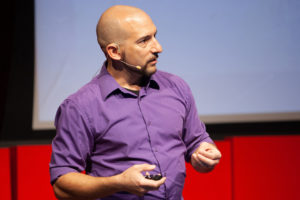Story by Samantha Ye

Our boys of color are brilliant, and it will take transforming our classrooms to let that show — this was the message Vincent Basile delivered at his March 7 TEDxCSU talk, “Decriminalizing Our Elementary School Boys of Color.”
Basile is an assistant professor in the Colorado State University School of Education and scholar in the Race and Intersectional Studies in Educational Equity (RISE) Center. TEDxCSU is an annual event independently organized by CSU to share the ideas and work of local community members. Basile was one of nine scheduled speakers.
Studying the double standard
As a social scientist, Basile has spent the last 10 years studying how schools treat boys of color like they’re criminals. Following this criminalization is a “master narrative” which claims those students are violent, disrespectful, or truant.
“The thing is, this narrative is empirically false,” Basile said. “In fact, in some elementary schools, boys of color go to class more than their white peers, oftentimes are more innovative in small group work, and sometimes, they know more about what’s going on in the classroom than even the teacher does.
“And yet, in elementary school, boys of color are punished more severely, and more frequently, than their white peers for the same disciplinary infractions, sometimes for doing nothing at all.”
Basile gave several examples of this double standard. Where white students were allowed to apologize and move on for infractions like fighting, boys of color were severely disciplined for doing things like walking down the hallway while pretending to be an airplane. One boy of color was even suspended for repeatedly tipping his chair back. His teacher labeled him “a thug,” Basile said.
And while this is a problem, some teachers are doing something about it.
Classroom practices that make a difference
“Over the last several years, I’ve seen multiple teachers that have purposely engaged their classroom with practices oriented around decriminalizing our boys of color,” Basile said.
Those practices he grouped into six categories:
- Assuming brilliance: starting with the assumption that however students are choosing to learn and interact is brilliant, and it’s up to the teacher to see it.
- Positive reframing: taking what would usually be viewed as something negative and intentionally reframing it positively.
- Highly respectful interactions: choosing language and tone to clearly show boys of color they are welcomed in the space, both as students and as human beings.
- Honoring space: recognizing boys of color will experience criminalization and may need time and space to regroup or even engage in some healthy resistance.
- Repair: when teachers make missteps, they must recognize it, fix what they’ve done wrong, and repair the relationship.
- Structures and policies: making clear decisions about how to structure and conduct classes to ensure all students, especially boys of color, are welcome in what they’re doing.
“These practices are dynamic, they interact with each other, and when teachers do them, it has immediate and profound results,” Basile said.
‘Let them be who they are’
An example Basile gave was about a boy of color named Marvin, who instead of drawing a diagram, demonstrated his understanding of the rock cycle by smashing two soft pumice rocks together, causing them to crumble.
Where the teacher could have reacted to this as “breaking school property” and punished Marvin, she instead made a very purposeful decision to ask him what he was doing.
Marvin responded, “Oh, I’m doing erosion.”
“Marvin was brilliant; Marvin showed that he understood this rock cycle probably better than anybody in the class,” Basile said.
What these teachers have shown by engaging in these deliberate practices in decriminalization is that all boys of color are brilliant, Basile said, and “that all we have to do is make the classroom a better and more welcoming space for them and get out of the way.”
“For a long time in education, we’ve been asking this question of ‘How do we fix our boys of color?’” Basile said. “And what these teachers have shown us is maybe we should be asking ‘How do we fix the system and let them be who they are?’”
Basile has written several peer-reviewed papers about the criminalization of boys of color and decriminalizing practices in schools. They can be found on the RISE Center research webpage under the Selected Research Projects tabs.
The RISE Center is housed in the School of Education, part of CSU’s College of Health and Human Sciences.